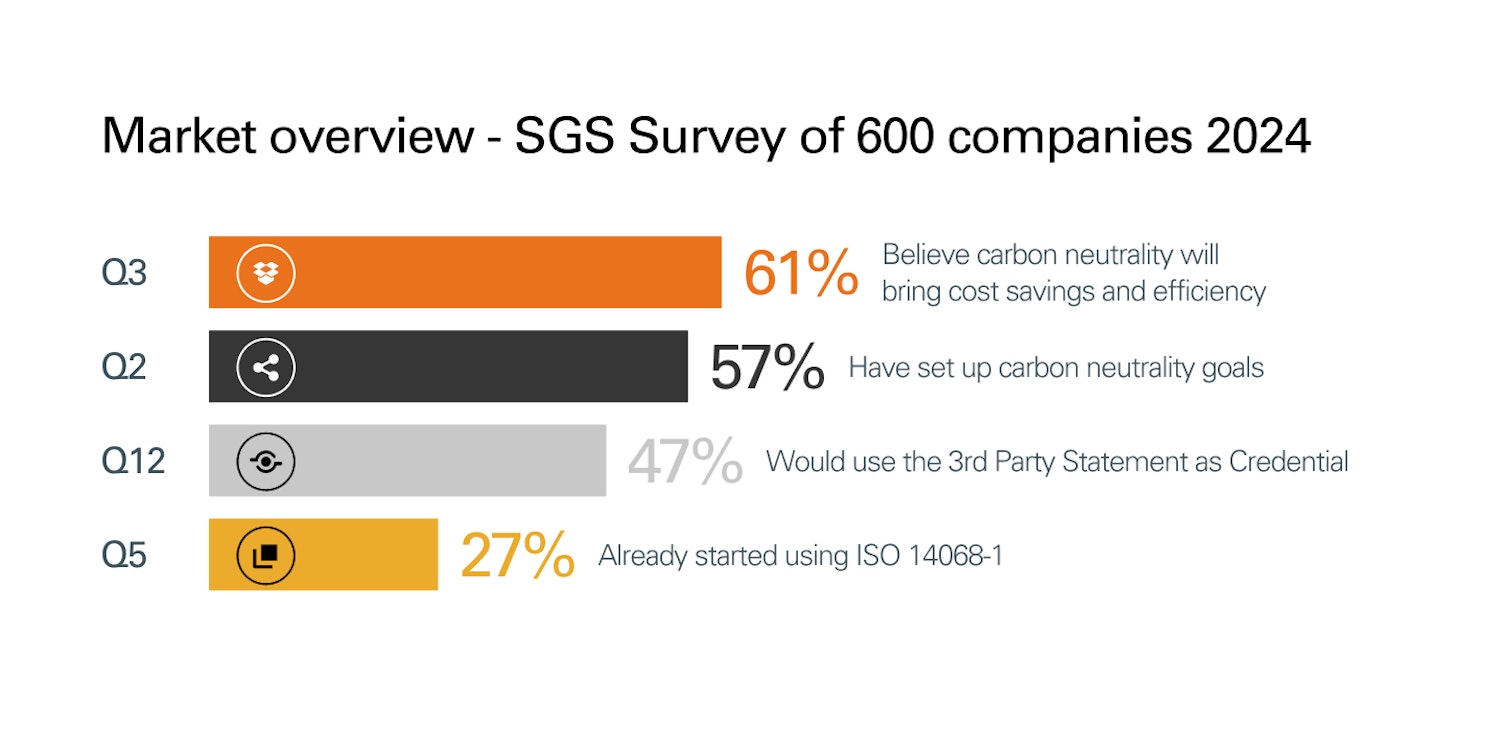The term "net zero" signifies the balance between the amount of greenhouse gases emitted and the amount removed from the atmosphere. Achieving net zero emissions is essential for mitigating the effects of climate change and ensuring global temperature stability.
In this article, we explore the ISO 14068-1 Standard and the verification solutions provided by SGS in the GCC region. We also highlight the proactive steps taken by GCC countries towards environmental sustainability and climate change mitigation.
Progress Toward Net Zero in GCC Countries
In the Gulf Cooperation Council (GCC) region, ambitious strides are being made towards this goal, reflecting a growing commitment to environmental sustainability and energy transition.
UAE Net Zero 2050: Leading Climate Action in MENA
The UAE's "Net Zero by 2050" strategic initiative marks a significant commitment as the first MENA region country to set a national goal aligned with the Paris Agreement's aim to cap the global temperature rise at 1.5°C above pre-industrial levels.
Saudi Arabia's Green Initiatives: Toward a Sustainable Future
Saudi Arabia is aggressively pursuing a clean energy future, aiming to generate 50% of its electricity from renewables by 2030 as part of the Saudi Green Initiative (SGI). This plan includes investing in new energy sources, enhancing energy efficiency, and developing a robust carbon capture program. The initiatives extend to extensive tree planting and efforts to protect land and sea, highlighting the Kingdom's comprehensive approach to reducing emissions and championing climate action.
Bahrain: Proactive Climate Governance
In 2007, Bahrain took a proactive step towards addressing climate change by forming the Joint National Committee on Climate Change. This committee is spearheaded by the Supreme Council for Environment and focuses on a wide array of climate-related actions, including both mitigation and adaptation strategies.
Kuwait: Comprehensive Climate Action Framework
The National Committee on Ozone and Climate Change was established in Kuwait, led by the Environment Public Authority and including key stakeholders from various governmental sectors such as the Ministry of Oil, Kuwait Petroleum Corporation, and the Ministry of Electricity and Water. In 2019, Kuwait also launched its National Adaptation Plan, spanning from 2019 to 2030, with an ambitious target to voluntarily reduce its emissions by 7.4% by 2035.
Oman: Strategic Steps Towards Carbon Neutrality
Managed by the Environment Authority, Oman unveiled a national climate change strategy in 2019 aimed at both mitigation and adaptation. Furthering its commitment, Oman introduced a national hydrogen economy strategy in 2020 and, by November 2022, announced plans to achieve carbon neutrality by 2050 ahead of the UN Climate Change Conference (COP27).
Qatar: Institutionalizing Climate Change Mitigation
Qatar took significant steps in 2021 by having its Council of Ministers approve the National Climate Change Plan, which serves as a guide for climate-aware decision-making across various sectors. Later that year, Qatar established the Ministry of Environment and Climate Change to specifically tackle climate-related challenges.
Understanding ISO 14068-1: The New Standard for Climate Change Management
ISO 14068-1 is the first globally recognized ISO standard for achieving and demonstrating carbon neutrality. The standard specifies principles, requirements and guidance for achieving and demonstrating carbon neutrality through quantifying, reducing and offsetting the carbon footprint.
A recent survey conducted by SGS in 2024, encompassing insights from 600 companies, revealed that 61% believe carbon neutrality will lead to cost-savings and enhanced efficiency, while 57% have already established carbon neutrality goals, underlining the growing importance and adoption of such practices in today's business landscape.
Who is it for?
ISO 14068-1 Climate Change Management is designed for any entity that aims to achieve and demonstrate carbon neutrality. This includes:
- Companies across various industries
- Local authorities and government bodies
- Financial institutions and investment firms
Additionally, ISO 14068-1 is relevant for:
- Any product or service provider striving for carbon neutrality
- Organizations hosting events, such as conferences or exhibitions
- Builders and owners of sustainable buildings
Key Benefits of ISO 14068-1
Implementing ISO 14068-1 Climate Change Management offers several key benefits:
- Enhanced credibility and trust: It helps organizations establish credibility and trust in their carbon neutrality claims by providing a structured framework for managing and reducing carbon emissions.
- Built upon international standards: ISO 14068-1 builds upon existing international standards like ISO 14064 (Greenhouse gases) and ISO 14067 (Carbon footprint of products) to ensure alignment with established best practices.
- Contribution to Sustainable Development Goals (SDGs): By adopting ISO 14068-1, organizations contribute to a range of UN Sustainable Development Goals (SDGs) from 1 to 16, including goals related to climate action, sustainable cities and communities, responsible consumption and production, and partnerships for the goals.
SGS Solutions for Achieving Net Zero in the GCC
SGS, with its robust presence across all GCC countries including Saudi Arabia, UAE, Bahrain, Oman, Qatar, and Kuwait, is at the forefront of assisting organizations and governments in their journey to net zero. Our solutions include:
- Unaccredited ISO 14068-1 verification and validation against ISO 14064-3
- Gap Assessments to determine the best path forward
- Ongoing assistance through training to ensure that your organization meets the environmental and regulatory objectives
Transitioning to net zero is a complex but essential undertaking. With the guidance of ISO 14068-1 and the expert support from SGS, organizations and governments in the GCC can navigate this path efficiently and effectively, making substantial contributions to global climate goals.
About SGS
We are SGS – the world’s leading testing, inspection and certification company. We are recognized as the global benchmark for sustainability, quality and integrity. Our 99,600 employees operate a network of 2,600 offices and laboratories around the world.
SGS Building, Street no. N 203,
Jebel Ali Free Zone North,
Dubai, United Arab Emirates





